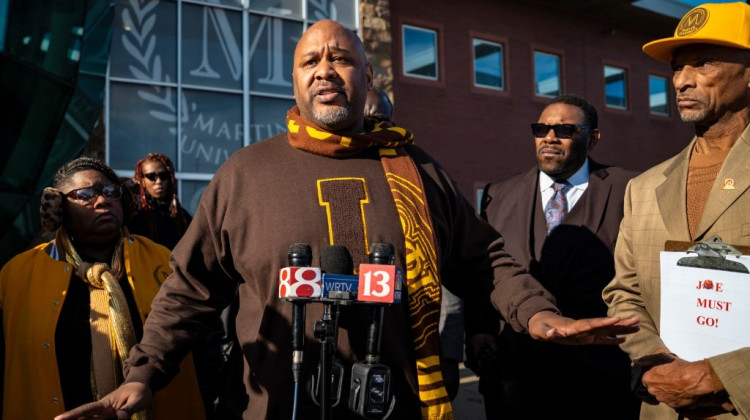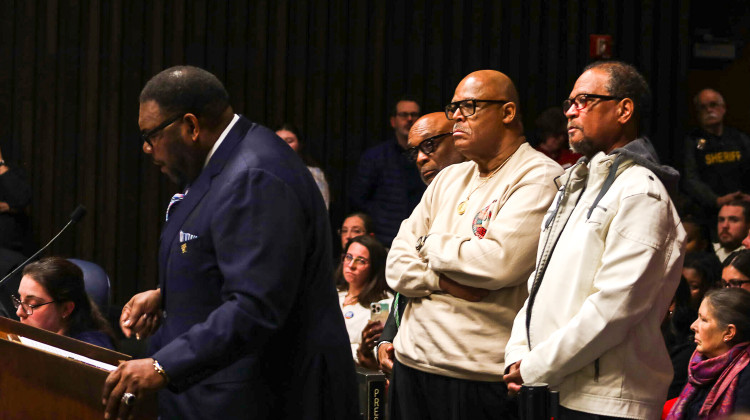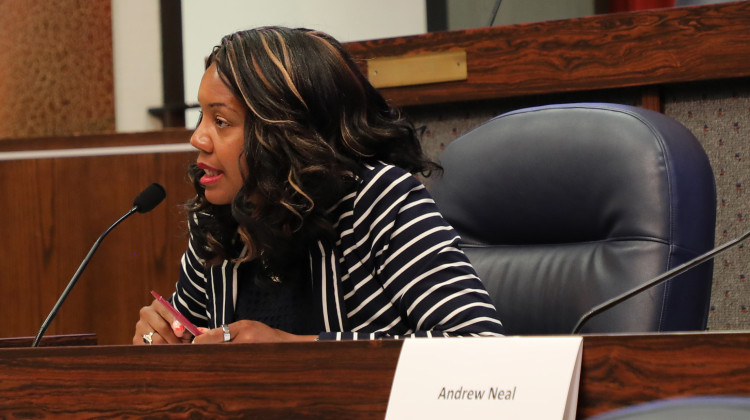
In the past two months, charter operators and advocates demand an equal share of the potential funds from IPS.
Eric Weddle/WFYIUpdated 10:45 a.m., Jan. 27
The Indy Chamber announced in a statement Friday that it does not support Indianapolis Public Schools’ proposed property tax increase.
In the statement, the Chamber recognized the district’s need for funding. It also urged IPS leaders to answer business and community questions – including other revenue options, and how its Rebuilding Stronger plan will address lagging academic achievement and racial equity in the district – before moving forward with its plan to place tax referendums on the May primary ballot.
“We believe that more time and engagement are required to allow the community to fully vet the current proposal, build support for a path forward, and work with state lawmakers to address inequities in the school funding formula that disadvantage IPS and many other schools across the state,” the statement read. “The Indy Chamber looks forward to assisting district leaders in this work and remains committed to the success of IPS and its students.”
IPS earned support for its 2018 referendum by partnering with the Indy Chamber and the local business community.
After mounting pressure from charter school advocates, leaders at Indianapolis Public Schools are close to sharing more property-tax revenue with charter operators who partner with the district.
The seven-member IPS board of commissioners is set to vote at a 10 a.m. public meeting Saturday at the Madam Walker Legacy Center on whether to place a $413.6 million operating tax referendum on the May 2 primary ballot. The money goes mostly to boost pay for district teachers.
In the past two months, charter operators and advocates have demanded an equal share of the potential funds from IPS. Without the extra support, they say students who attend non-district city schools would face a widening racial and socioeconomic equity gap. The district administrators responded by delaying a vote to approve the ballot measure as the they made adjustments to attract more support.
The board already approved a $410 million capital referendum on the spring ballot to pay for building renovations at more than two dozen facilities and construction for a new elementary building.
Both referendums are part of the district’s Rebuilding Stronger plan to overhaul academic offerings and school configurations for K-8 students.
But many students, parents and education advocacy groups — such as Empowered Families and RISE Indy — have spoken out against the operating referendum because they don’t think it equitably funds the district’s innovation charter partners and the city’s independent charter schools.
“What it comes down to: If we’re going to ask all Indianapolis residents to pay for this increase, especially in these tough economic times, we need to ensure all of our public school students share that funding,” said RISE Indy CEO Jasmin Shaheed-Young in a statement.
IPS initially planned to provide innovation charter schools with $650 for each student who lives in the district boundary. At the same time, funding for each student in IPS-run schools would increase by around $2,300, and independent charter schools not in partnership with the district would receive nothing.
Innovation and independent charter schools do not directly receive referendum or other property-tax revenue unless a school district agrees to share it, according to state law.
In wake of the opposition from charter advocates, IPS recently adjusted its proposed operating referendum to provide innovation charter partners with roughly $1,000 of per pupil funding. Independent charters would still not receive funding.
As part of the new sharing plan, 22 innovation network schools would receive a total estimated maximum of $9.7 million annually from the district's referendum funds.
But Jordan Habayeb, managing operations director of Adelante Schools, said innovation schools still want more.
"When we look at it towards the lens of equity, and particularly the number of scholars that innovation schools specifically serve, the conversation should still be ongoing,” Habayeb said.
Many of the district’s notable, longtime partners have also spoken out against the plan.
Stand For Children Indiana — a chapter of the national advocacy group who’ve led program changes at failing schools and campaigned in support of the district’s last referendum — do not support it.
The Mind Trust — the local education reform group who developed charter school partnerships with IPS and the city — released a rare signed statement by staff and board members opposed to the tax increase because it would “widen existing public school funding disparities.”
“It's important for the district to take into account the rising property taxes that disproportionately impact marginalized families in IPS,” said The Mind Trust CEO Brandon Brown. “And while I think our community could get behind more resources for schools, we’ve got to be thoughtful around how much we're asking from our families and what the impact is on rising property tax values combined with a new referendum.”
Others are supporting the referendums as a way to fund the Rebuilding Stronger plan.
In an op-ed published Thursday in the Indianapolis Star, a group of IPS alumni wrote that academic and building changes would ensure "every single student in Indianapolis — in every neighborhood — will have access to a great school and excellent choices."
The group, which includes the CEO of Pacers Sports & Entertainment Rick Fuson, said in order for that to happen, both referendums need voters’ approval in May.
The backstory
In November, the IPS board of commissioners unanimously approved its Rebuilding Stronger plan, which will close or merge six school buildings and provide more learning models for grades K-8 to boost academic performance.
The plan will be funded through two different means — a capital referendum and operating referendum.
If the $410 million capital referendum is approved, the local property tax levy for the capitol referendum would be no more than $0.2066 per $100 of assessed value. It would add $3.18 per month in property taxes to homeowners of a median-valued property.
The $413.6 million operating referendum, or $51.7 million annually, is proposed to replace a current $220 million property-tax referendum approved by voters in 2018. If approved, the local property tax levy for the operating referendum would switch from $0.19 to no more than $0.25 per $100 of assessed value on Jan. 1, 2024, and add $2.60 per month in property taxes to homeowners of a median-valued property, according to the district.
The IPS board has until Feb. 17 to vote on whether to add the operating referendum to the Marion County ballot, according to state code.
WFYI education editor Eric Weddle contributed to this report.
Contact WFYI education reporter Elizabeth Gabriel at egabriel@wfyi.org. Follow on Twitter: @_elizabethgabs.
 DONATE
DONATE







 Support WFYI. We can't do it without you.
Support WFYI. We can't do it without you.